一般过去时详细讲解与练习题
(完整版)一般过去时讲解及练习
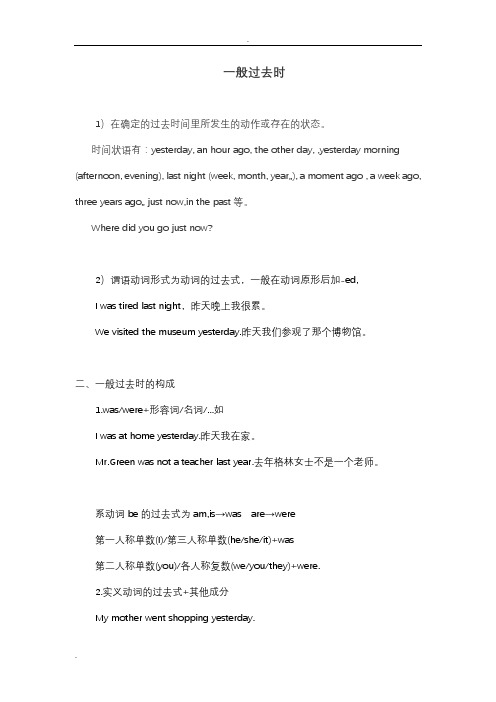
一般过去时1)在确定的过去时间里所发生的动作或存在的状态。
时间状语有:yesterday, an hour ago, the other day, ,yesterday morning (afternoon, evening), last night (week, month, year…), a moment ago , a week ago, three years ago… just now,in the past等。
Where did you go just now?2)谓语动词形式为动词的过去式,一般在动词原形后加-ed,I was tired last night,昨天晚上我很累。
We visited the museum yesterday.昨天我们参观了那个博物馆。
二、一般过去时的构成1.was/were+形容词/名词/...如I was at home yesterday.昨天我在家。
Mr.Green was not a teacher last year.去年格林女士不是一个老师。
系动词be的过去式为am,is→was are→were第一人称单数(I)/第三人称单数(he/she/it)+was第二人称单数(you)/各人称复数(we/you/they)+were.2.实义动词的过去式+其他成分My mother went shopping yesterday.我妈妈昨天去购物了。
His uncle worked in Beijing in 2014.他叔叔2014年在北京工作。
三、一般过去时的句式四、动词过去式的变化规则3 used toused to + do:"过去常常"表示过去习惯性的动作或状态,但如今已不存在。
Mother used to take a walk. (过去常常散步)二、构成及变化1. Be动词在一般过去时中的变化:am 和is在一般过去时中变为was。
(完整版)初中一般过去时详细讲解与练习
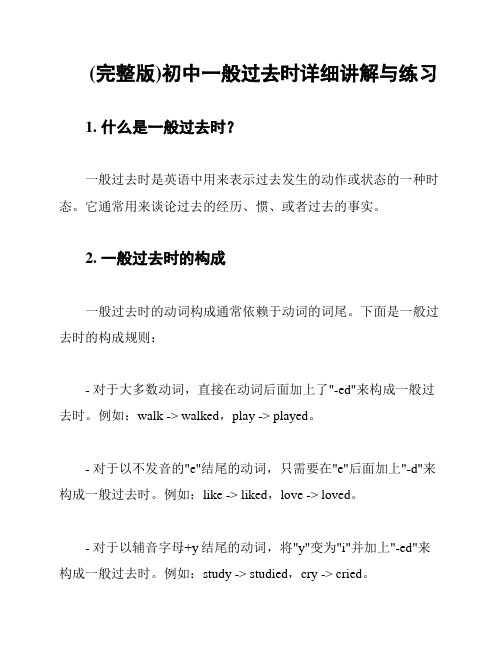
(完整版)初中一般过去时详细讲解与练习1. 什么是一般过去时?一般过去时是英语中用来表示过去发生的动作或状态的一种时态。
它通常用来谈论过去的经历、惯、或者过去的事实。
2. 一般过去时的构成一般过去时的动词构成通常依赖于动词的词尾。
下面是一般过去时的构成规则:- 对于大多数动词,直接在动词后面加上了"-ed"来构成一般过去时。
例如:walk -> walked,play -> played。
- 对于以不发音的"e"结尾的动词,只需要在"e"后面加上"-d"来构成一般过去时。
例如:like -> liked,love -> loved。
- 对于以辅音字母+y结尾的动词,将"y"变为"i"并加上"-ed"来构成一般过去时。
例如:study -> studied,cry -> cried。
- 部分动词的一般过去时需要进行不规则变化。
例如:go -> went,eat -> ate。
3. 一般过去时的用法一般过去时通常用来描述以下情况:- 过去发生的动作:I walked to school yesterday.- 过去的经历:He lived in London for five years.- 过去的事实:She was a teacher in the past.4. 一般过去时的句型练下面是一些练,帮助加深对一般过去时的理解和运用:1. 请用一般过去时填空:Yesterday, I ________ (watch) a movie at home.2. 完成句子:He _____ (visit) his grandparents last summer.3. 改写句子,使用一般过去时:I read a book yesterday. (改为否定句)4. 改写句子,使用一般过去时:They played basketball in the park. (改为疑问句)5. 总结一般过去时是用来表示过去发生的动作或状态的一种时态。
高考英语一般过去时解题技巧讲解及练习题(含答案)
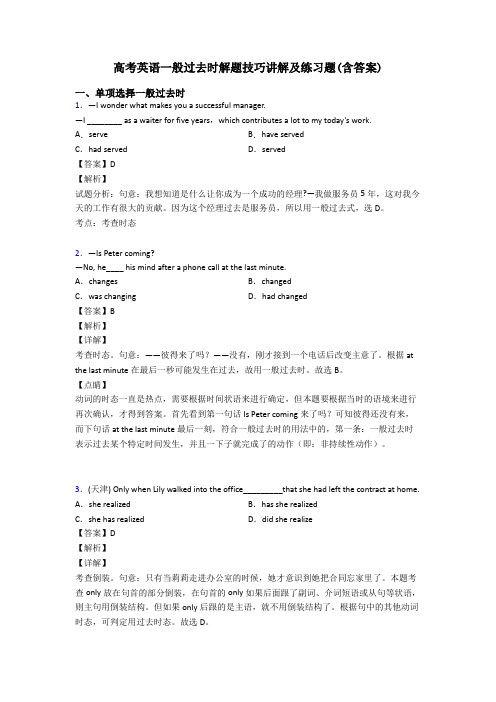
高考英语一般过去时解题技巧讲解及练习题(含答案)一、单项选择一般过去时1.—I wonder what makes you a successful manager.—I ________ as a waiter for five years,which contributes a lot to my today’s work.A.serve B.have servedC.had served D.served【答案】D【解析】试题分析:句意:我想知道是什么让你成为一个成功的经理?—我做服务员5年,这对我今天的工作有很大的贡献。
因为这个经理过去是服务员,所以用一般过去式,选D。
考点:考查时态2.—Is Peter coming?—No, he____ his mind after a phone call at the last minute.A.changes B.changedC.was changing D.had changed【答案】B【解析】【详解】考查时态。
句意:——彼得来了吗?——没有,刚才接到一个电话后改变主意了。
根据at the last minute在最后一秒可能发生在过去,故用一般过去时。
故选B。
【点睛】动词的时态一直是热点,需要根据时间状语来进行确定,但本题要根据当时的语境来进行再次确认,才得到答案。
首先看到第一句话Is Peter coming来了吗?可知彼得还没有来,而下句话at the last minute最后一刻,符合一般过去时的用法中的,第一条:一般过去时表示过去某个特定时间发生,并且一下子就完成了的动作(即:非持续性动作)。
3.(天津) Only when Lily walked into the office_________that she had left the contract at home. A.she realized B.has she realizedC.she has realized D.did she realize【答案】D【解析】【详解】考查倒装。
英语一般过去时形式讲解及答案
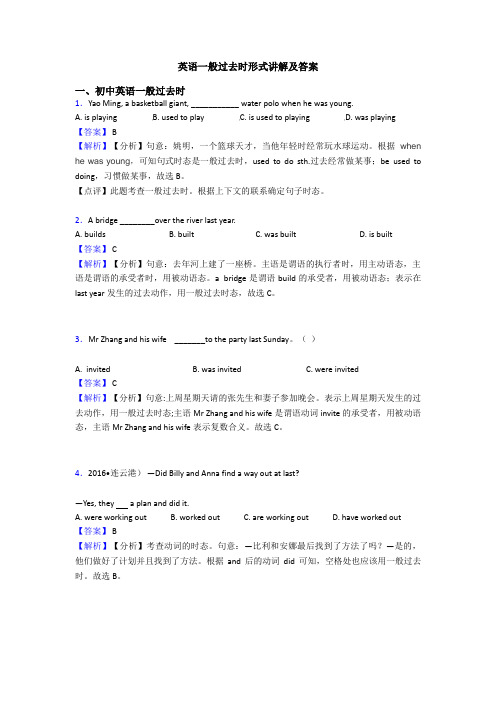
英语一般过去时形式讲解及答案一、初中英语一般过去时1.Yao Ming, a basketball giant, ___________ water polo when he was young.A. is playingB. used to playC. is used to playingD. was playing【答案】 B【解析】【分析】句意:姚明,一个篮球天才,当他年轻时经常玩水球运动。
根据when he was young,可知句式时态是一般过去时,used to do sth.过去经常做某事;be used to doing,习惯做某事,故选B。
【点评】此题考查一般过去时。
根据上下文的联系确定句子时态。
2.A bridge ________over the river last year.A. buildsB. builtC. was builtD. is built【答案】 C【解析】【分析】句意:去年河上建了一座桥。
主语是谓语的执行者时,用主动语态,主语是谓语的承受者时,用被动语态。
a bridge是谓语build的承受者,用被动语态;表示在last year发生的过去动作,用一般过去时态,故选C。
3.Mr Zhang and his wife _______to the party last Sunday。
()A. invitedB. was invitedC. were invited【答案】 C【解析】【分析】句意:上周星期天请的张先生和妻子参加晚会。
表示上周星期天发生的过去动作,用一般过去时态;主语Mr Zhang and his wife是谓语动词invite的承受者,用被动语态,主语Mr Zhang and his wife表示复数合义。
故选C。
4.2016•连云港)—Did Billy and Anna find a way out at last?—Yes, they a plan and did it.A. were working outB. worked outC. are working outD. have worked out【答案】 B【解析】【分析】考查动词的时态。
超详细一般过去时的全面讲解【附练习与答案】
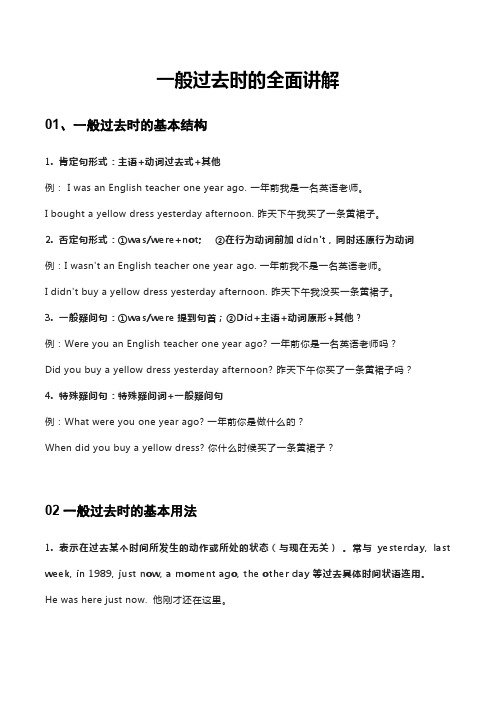
一般过去时的全面讲解01、一般过去时的基本结构1. 肯定句形式:主语+动词过去式+其他例: I was an English teacher one year ago. 一年前我是一名英语老师。
I bought a yellow dress yesterday afternoon. 昨天下午我买了一条黄裙子。
2. 否定句形式:①was/were+not; ②在行为动词前加didn't,同时还原行为动词例:I wasn't an English teacher one year ago. 一年前我不是一名英语老师。
I didn't buy a yellow dress yesterday afternoon. 昨天下午我没买一条黄裙子。
3. 一般疑问句:①was/were提到句首;②Did+主语+动词原形+其他?例:Were you an English teacher one year ago? 一年前你是一名英语老师吗?Did you buy a yellow dress yesterday afternoon? 昨天下午你买了一条黄裙子吗?4. 特殊疑问句:特殊疑问词+一般疑问句例:What were you one year ago? 一年前你是做什么的?When did you buy a yellow dress? 你什么时候买了一条黄裙子?02一般过去时的基本用法1. 表示在过去某个时间所发生的动作或所处的状态(与现在无关)。
常与yesterday, last week, in 1989, just now, a moment ago, the other day等过去具体时间状语连用。
He was here just now. 他刚才还在这里。
What did you do yesterday? 你昨天做了什么事?2. 在过去一段时间内的经常性或习惯性动作。
一般过去时讲解及练习含答案
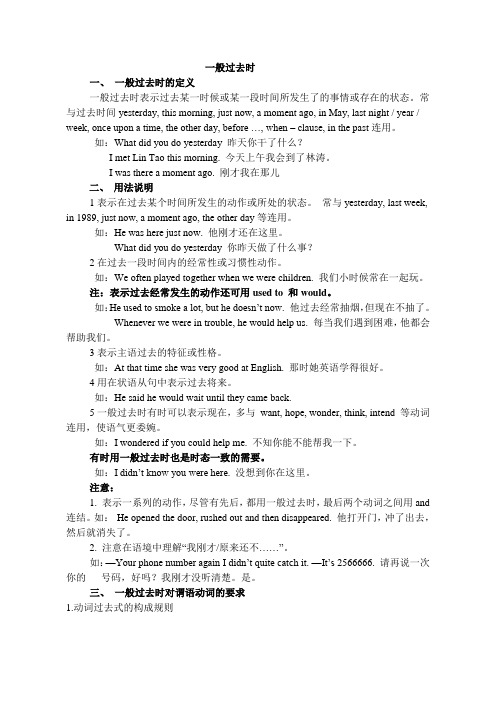
一般过去时一、一般过去时的定义一般过去时表示过去某一时候或某一段时间所发生了的事情或存在的状态。
常与过去时间yesterday, this morning, just now, a moment ago, in May, last night / year / week, once upon a time, the other day, before …, when – clause, in the past连用。
如:What did you do yesterday 昨天你干了什么?I met Lin Tao this morning. 今天上午我会到了林涛。
I was there a moment ago. 刚才我在那儿二、用法说明1表示在过去某个时间所发生的动作或所处的状态。
常与yesterday, last week, in 1989, just now, a moment ago, the other day等连用。
如:He was here just now. 他刚才还在这里。
What did you do yesterday 你昨天做了什么事?2在过去一段时间内的经常性或习惯性动作。
如:We often played together when we were children. 我们小时候常在一起玩。
注:表示过去经常发生的动作还可用used to 和would。
如:He used to smoke a lot, but he doesn’t now. 他过去经常抽烟,但现在不抽了。
Whenever we were in trouble, he would help us. 每当我们遇到困难,他都会帮助我们。
3表示主语过去的特征或性格。
如:At that time she was very good at English. 那时她英语学得很好。
4用在状语从句中表示过去将来。
如:He said he would wait until they came back.5一般过去时有时可以表示现在,多与want, hope, wonder, think, intend 等动词连用,使语气更委婉。
一般过去时详细讲解与练习

一般过去时讲解与练习一、概念:表示过去时间里发生的动作或存在的状态,或者过去习惯性、经常性的动作。
*句中一般有以下时间状语:1.时间+ago:a moment ago片刻之前;two minutes ago两分钟前;three hours ago三个小时前;fivedays ago五天前;one week ago一周前;six months ago六个月前,four years ago四年前st+时间last time上一次last night昨天晚上last week上个星期last month上个月last term 上个学期last Monday上周一last year去年3. yesterday+时间yesterday morning 昨天早上yesterday afternoon 昨天下午yesterday evening昨天晚上the day before yesterday前天the day before yesterday in the morning前天早上4. one +时间one day有一天one morning一天早上one evening一天晚上one Monday afternoon 一个星期一的下午5.其他时间状语just now刚才once upon a time很久以前in 1980在1980年时the other day 几天前at that time在那时二、基本结构:①主语+谓语(动词过去时)+句子其他成分②主语+was/were+形容词/名词/介词短语+过去时间。
三、主语+谓语(动词过去时)+句子其他成分的句型变化:1.肯定句: I worked in that hospital last year. 我去年在那家医院上班。
2.否定句: I didn’t work in that hospital last year.3.一般疑问句:Did you work in that hospital last year?4.肯定和否定回答: Yes, I did. No, I didn’t.四、主语+was/were+形容词/名词/介词短语+过去时间的句型变化1.肯定句: I was fat three years ago. 我三年前很胖。
(英语)高考英语一般过去时解题技巧讲解及练习题(含答案)

(英语)高考英语一般过去时解题技巧讲解及练习题(含答案)一、单项选择一般过去时1.Sales of CDs have declined dramatically since the early 2010s, when people ______ to enjoy music downloaded from the internet.A.have begun. B.began. C.begin. D.would begin.【答案】B【解析】【详解】考查动词时态。
句意:自2010年代初以来,CD的销量急剧下降,当时人们开始享受从互联网下载的音乐。
when引导的是定语从句,此处指the early 2010s发生的事,用一般过去时。
故选B.2.—That must have been a hard project?—Yeah, it _____ us a whole year to finish the work.A.took B.has takenC.takes D.was taking【答案】A【解析】考查时态。
That must have been ……是对过去情况的判断,所以 it ___us a whole week to get there. 是在陈述过去的一个事件,要用过去时。
句意:那一定是很长的旅程。
--是的,我们花了一周才到。
选A。
【名师点睛】时态题的考查关键是抓住句子的上下文含义和句中的时间状语。
要根据时间状语来选择合适的时态,在平时的学习中要注意积累有关时态的用法和各种时态的特殊之处。
这句话的解题关键是That must have been a long trip.说明是对过去事情的推测。
3.—Ouch! You hurt me.—I'm sorry. But I ________ any harm. I ________ to drive a rat out.A.don't mean; am tryingB.didn't mean; triedC.haven't meant; triedD.didn't mean; was trying【答案】D【解析】【详解】考查动词的时态。
- 1、下载文档前请自行甄别文档内容的完整性,平台不提供额外的编辑、内容补充、找答案等附加服务。
- 2、"仅部分预览"的文档,不可在线预览部分如存在完整性等问题,可反馈申请退款(可完整预览的文档不适用该条件!)。
- 3、如文档侵犯您的权益,请联系客服反馈,我们会尽快为您处理(人工客服工作时间:9:00-18:30)。
一般过去时详细讲解与练习题一、巧记一般过去时:动词一般过去时,表示过去发生的事;be用was或用were, have,has变had;谓语动词过去式,过去时间作标志;一般动词加-ed,若是特殊得硬记。
否定句很简单,主语之后didn’t添;疑问句也不难,did放在主语前;不含be动词时如果谓语之前有did,谓语动词需还原;动词若是was,were,否定就把not添。
含be动词时疑问句也不难,要把was,were放在主语前。
二、be的一般过去时:学习动词be的一般过去时,下面有一口诀,它可以帮你们更好地掌握动词be的一般过去时。
be的过去时有四巧:一是时间状语巧,表示过去的短语要记牢;二是形式巧,单数was,复数were;三巧是否定句结构,not紧跟was/were;四是疑问句式巧,was/were向前跑(提前)。
【一巧】时间状语(即标志词)巧。
一般过去时表示过去发生的动作或存在的状态,恰巧与表示过去的一些时间状语连用。
【二巧】形式巧。
它与一般现在时一样,形式多样:当主语是第一人称单数或第三人称单数时,谓语动词用was;主语是第二人称或其他人称复数时,谓语动词用were。
例如: I was in the classroom yesterday morning.昨天早上我在教室里。
He was at school last Tuesday.上周二他在学校。
They were over there a moment ago.刚才他们在那边。
【三巧】否定句结构巧。
与动词be的一般现在时一样,它在动词后面加not 即可变成否定句,并且was, were与not可以缩写成wasn't, weren't。
即:主语+ wasn't/ weren't +表语+其他。
例如:I was not (=wasn't) here yesterday.昨天我不在这儿。
My parents were not (=weren't) at home last Sunday.上周日我父母不在家。
【四巧】疑问句式巧。
把was, were提到句首,句末用问号即可变为一般疑问句。
即:Was(Were) +主语+表语+其他?这恰巧与动词be的一般现在时的疑问句式相似。
例如: Were you at home the day before yesterday﹖前天你在家吗?Was she late this morning﹖今天早上她迟到了吗?更巧的是疑问句的答语也相似,肯定回答用“Yes, 主语+was/were.”;否定回答用“No,主语+wasn't/weren't.”。
例如:—Were Wei Hua and Han Mei here just now﹖刚才魏华和韩梅在这儿吗?—Yes, they were. (No, they weren't.) 是的,她们在。
(不,她们不在。
)一、单项选择:从下列各题后所给的四个选项中选择最佳答案填空。
(10)( )1. My father______ill yesterday.A. isn't B. aren't C. wasn't D. weren't( )2.______your parents at home last week﹖A. Is B. Was C. Are D. Were( )3. The twins______in Dalian last year. They______here now.A. are; were B. were; are C. was; are D. were;was( )4.______your father at work the day_____yesterday(前天)﹖A. Was; before B. Is; before C. Was; after D. Is; after( )5.—Who was on duty last Friday﹖—______.A. I am B. I was C. Yes, I was D. No, Iwasn't( )6. I cleaned my classroom ___________.A with three hoursB three hours agoC in three hoursD three hours before( ) 7. I came _______ my house two days ago .A back onB back toC to back D1. yesterday或以其构成的短语:yesterday morning(afternoon, evening)等;2. 由“last+一时间名词”构成的短语:last night, last year (winter, month, week)等;3. 由“时间段+ago”构成的短语:a moment ago, a short time ago, an hour ago等;4. 其它:just now等back( ) 8 . ___________? He did some reading at home.A What does your father do yesterday eveningB What does your brother do in the schoolC What did your brother do over the weekendD Where did your brother go last Sunday( ) 9. What did you do ________ ? I went to the movies.A next morning Bover the weekend C in the weekend D nextMonday( ) 10. The koala sleeps _______,but gets up _________.A during the day; at the eveningB atday ;during nightC in the day ;during the eveningD duringthe day ; at night二、请用正确动词形式填空。
(10)1. I _________ (have) an exciting party last weekend.2. _________ she _________(practice) her guitar yesterday? No,she _________.3. What ________ Tom ________ (do) on Saturday evening?He ________(watch) TV and __________(read) an interesting book.4. They all _________(go) to the mountains yesterday morning.5. She _________(not visit) her aunt last weekend.She ________ (stay) at home and _________(do) some cleaning.6. When ________ you _________(write) this song? I __________(write)it last year.7. My friend, Carol, ________(study) for the math test and________(practice) English last night.8. ________ Mr. Li __________(do) the project on Monday morning? Yes,he _________.9. How _________(be) Jim's weekend? It _________(be not) bad.10. ________ (be) your mother a sales assistant last year? No. she__________.三、翻译下列句子(20)1. 我过了一个忙碌但却刺激的周末。
I _________ _________ __________ __________ exciting weekend.2. Jenny喜欢看书。
昨晚她看了一本英语书。
Jenny likes _________ __________. She _________ an English book last night.3. Emma每天都看电视。
可是昨天他没有看。
Emma__________ TV every day. But he _________ ________ ________ yesterday.4. 上周六他们做什么了?他们做作业和购物了。
What ________ they _________ _________ Saturday?They _________ __________ homework and _________ __________.5. 今天早上方方得做饭,因为他父亲不在家。
This morning Fangfang ____ ____ ____ ____ because his father _____ _____ ____ yesterday.6. 你还有什么要说的? What _______ would you like _______ _______?7. 放学别忘了向老师说声再见。
Don’t forget ______ _______ ______________ the teacher.8. 为什么你昨晚没有看电视? Why _______ you _______ TV last night?9. 他在打扫教室的时候,发现地上有块表。
When he ______ the classroom, he ______ a watch on the ground.10. 他什么时候出生的?1980年。
---When _______ he _______? ---_______1980.四、改写句子:(20)1、Lucy did her homework at home.(改否定句)Lucy ________ _______ herhomework at home.2、He found some meat in the fridge(冰箱).(变一般疑问句)___________ he __________ ___________ meat in the fridge?3、There was some orange in the cup.(变一般疑问句)_______ there _______orange in the cup?4. Frank read an interesting book about history. (一般疑问句)_______ Frank _______ an interesting book about history?5. Why not go out for a walk? (同义句) _______ ________ ________ outfor a walk?6. Thomas spent RMB 10 on this book. (否定句) Thomas______ _____RMB10 on this book.7. My family went to the beach last week. (划线提问)________ ________ ________ family _______ last week?8. I think she is Lily’s sister. (否定句。
